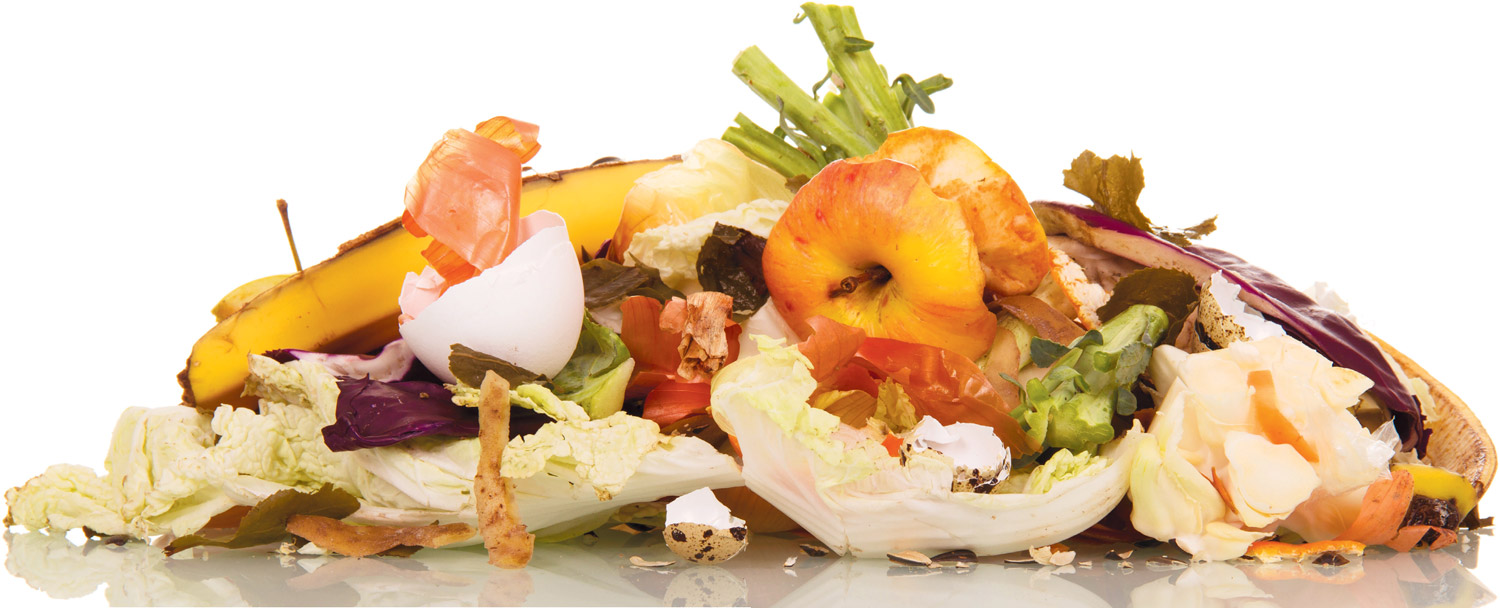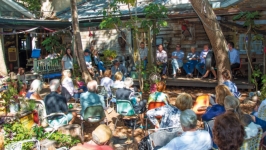Food Waste From Trash to Treasure
Picture a pile of spotted banana peels, sodden coffee grounds, slivers of potato skins, bumpy orange rinds, and smashed eggshells. What’s the first word to pop into your head? If it were dumped into a landfill, “garbage” would a totally accurate term for these kitchen castoffs. Deprived of oxygen, the decomposition rate of food waste slows to a putrid crawl in landfills—a head of lettuce, for example, can take up to 25 years to completely decay.
That’s one of the dismaying stats revealed in the documentary Wasted! The Story of Food Waste. Produced by incendiary celeb chef Anthony Bourdain, Wasted! explores a world in which one-third of all the food grown is never eaten, but millions of people senselessly go hungry. Ninety percent of this food waste ends up landfills, robbed of its great potential to nourish people in need, raise healthy livestock, or generate clean energy. Even when food waste can’t achieve these ends, Wasted! shows it still has potential. That pile of scraps you just pictured doesn’t have to be trash. Inside a compost bin, it’s turned into treasure.
Wasted! embarked on a cross-country tour last fall, taking its urgent appeal to every level of the supply chain: No more food in landfills. Upon its arrival in Sarasota—a city whose natural beauty equals its passion for good eating—it met an audience awakened to the serious problem of food waste. But only a fraction of Sarasota’s population, and an even smaller percentage of its bustling food industry, participates in composting.
“We throw away 250,000 tons of waste a year in Sarasota, and 10 percent of that is food waste. It’s a big component,” says Randall Penn, the solid waste reduction agent with Sarasota County’s UF/IFAS Extension. The year 2020 looms large in Penn’s mind; it’s the deadline, set by the Florida Legislature in 2008, to achieve a 75 percent recycling rate statewide.
“To reach that goal—and we have 10 or 11 percent to go [in Sarasota County],” Penn says, “we’ve got to think about food waste, or we’ll never make that target.”
County ordinances restricting the transport and deposit of food waste have hindered development of a large-scale composting system in Sarasota County. But on a smaller, residential scale, the knowledge gap around composting poses the primary barrier—which Penn and the County Extension are attacking aggressively.
Last year, composting came straight to the public at three rowing events held in Nathan Benderson Park, including the acclaimed World Rowing Championships. During the competitions, the Extension collected roughly 1,000 pounds of food waste and converted it into soil amendment for the park, providing proof of concept for an on-site, closed-loop composting program at major events.
Penn has also engaged 100 local households in an ongoing residential composting study, which provided participants (34 percent of whom had no previous composting experience) with bins and training in exchange for monthly poundage reports. After the first six months, with 56 percent of participants weighing in, their reports totaled 5,078.9 pounds of food waste diverted from landfills. For Penn, this data is power.
“I’m trying to move the needle to get that ordinance removed, and move towards commercial pickup available in the county, as well as a residential pickup,” Penn says. “I think we’re a ways off from that, but the more we can combine these projects together and lay out the case, I think we can drive a new type of thinking here in the county.”
Within incorporated Sarasota, key differences in the city’s solid waste ordinances have created room for grassroots composting projects. Tucked away in the southeast corner of Newtown, the Orange Blossom Community Garden hosts seven enormous worm-composting trays and a long wall of active bins. Run by a small, hardworking volunteer corps, the composting operation is directed by Barbara Powell Harris, garden founder and coordinator. The site receives and processes food waste seven days per week, 364 days per year, only taking a holiday on Christmas. The finished “communal commodity” goes back into the garden’s plots, especially those dedicated to teaching neighborhood kids how to grow fresh, nutritious food.
Powell Harris isn’t satisfied with the thousands of pounds they save from landfills each year. She’s been at work on a business plan to take a bigger bite from the 2.5 tons of food waste she estimates—conservatively, at that—are generated daily within a two-mile radius around the garden.
“People can look forward to a more centralized, subscription type of compost pickup in the future,” Powell Harris says of the program, which she hopes to roll out in Sarasota’s downtown core this January. “It works in other places, and it will work in Sarasota, especially with the concentration of people we’ve got downtown.”
“What I’m finding about composting is that it’s in the back of a lot of people’s minds, but there’s not always an easy entry point,” Tracie Troxler offers. “And when you provide that … then people start showing up.”
Troxler manages Sunshine Community Compost, a nonprofit that’s the new name in local composting. The organization’s flagship project has taken the form of city park composting stations, where community members drop off their food waste, observe each step of the decomposition process, and receive a share of the sweet-smelling compost about every four months. At the Gillespie Park site, residents have made plans to apply their compost to a butterfly garden for the enjoyment of the neighborhood, not to mention its lovely winged guests.
From the standpoint of waste reduction, composting holds a special status. It returns nutrients to the earth so new life can emerge. It helps soil retain water, and even has the power to lock in toxic chemical compounds, keeping them from running off into our waterways. As composting programs like these propagate in Sarasota, community members are starting to realize that composting isn’t just a thing for master gardeners. It’s a way for everyone who eats to revitalize the planet.
What’s keeping you from transforming your trash into compost—not knowing what to do with all that treasure? Troxler has an idea for you: “Find your favorite tree and make a connection with nature—go give something back for all the ecosystem services that tree provides to us. It’s just another way to connect.”






